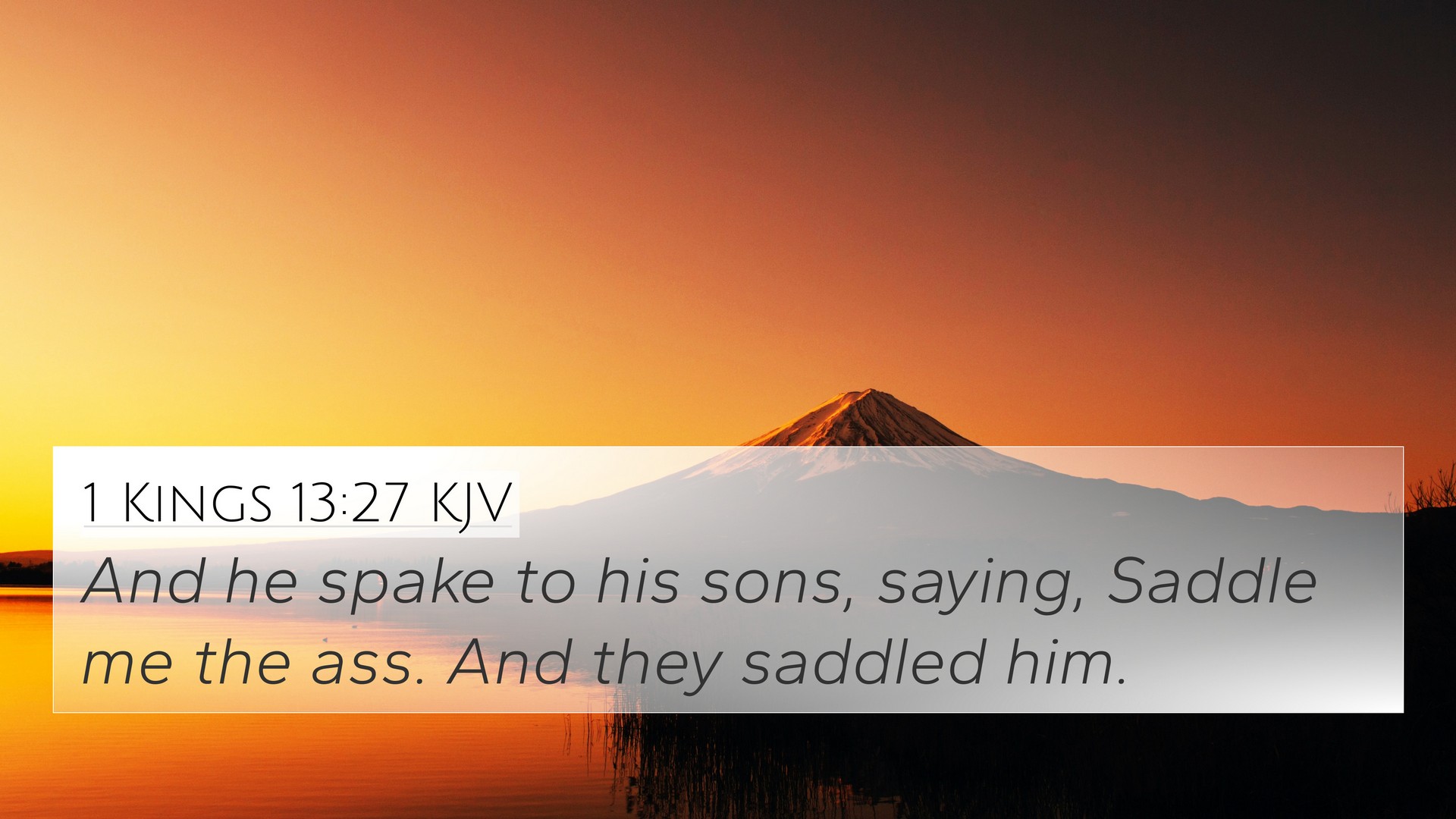Understanding 1 Kings 13:27
Bible Verse: 1 Kings 13:27 - "And he spake to his sons, saying, Saddle me the ass. And they saddled him the ass."
Overview
This verse comes from a narrative following a significant prophetic act and emphasizes the consequences of disobedience to God. It reflects the complexities of prophetic ministry, authority, and accountability in the biblical context.
Summarized Meaning & Insights from Commentaries
The verse features a prophetic rebuke and serves as a critical transition in the account where the disobedient prophet responds to his actions. Insights from several public domain commentators provide clarity:
Matthew Henry's Commentary
Matthew Henry highlights that the context surrounding this verse is saturated with themes of divine instruction and its violation. The action of the prophet’s sons saddling the ass demonstrates a submission to his father's commands, amplifying the tension between obedience to God and familial loyalty. Henry emphasizes the significance of parental authority and the responsibility to guide children in spiritual matters.
Albert Barnes' Notes
Albert Barnes points out that the act of saddling the ass is not merely a trivial detail but serves to progress the narrative and signifies a coming departure or journey. It symbolizes further steps taken by characters who have engaged with divine admonition. Barnes notes the importance of this action reflecting on the broader implications within the prophetic tradition and understanding one's mission from God, as illustrated through the prophet's struggles.
Adam Clarke's Commentary
Adam Clarke delves into the implications of the prophet's actions preceding this verse and suggests that the act of his sons obeying him reflects a reaction from the family unit in light of instruction. He notes how the urgency in the commands hints at the severity of the divine message and the ensuing consequences tied to obedience and rejection. Clarke also provides deeper insight into how such actions can mirror greater truths within scriptural contexts.
Connections and Cross-References
1 Kings 13:27 interlinks with multiple biblical verses, emphasizing the importance of obedience to God and the dynamics of prophetic roles. Here are relevant cross-references:
- 1 Kings 13:18 - "He said unto him, I am a prophet also as thou art; and an angel spake unto me by the word of the LORD, saying, Bring him back with thee into thine house." This emphasizes false prophets and discernment in direction.
- Jeremiah 23:28 - "The prophet that hath a dream, let him tell a dream; and he that hath my word, let him speak my word faithfully." This speaks to the validity and authenticity of prophetic messages.
- Acts 20:29-30 - "For I know this, that after my departing shall grievous wolves enter in among you, not sparing the flock." This warns of deceptive influences that parallel the theme of discernment in prophets.
- Romans 10:14 - "How then shall they call on him in whom they have not believed? And how shall they believe in him of whom they have not heard?" This connects to the importance of hearing and obeying God's message.
- 2 Corinthians 5:10 - "For we must all appear before the judgment seat of Christ; that every one may receive the things done in his body, according to that he hath done, whether it be good or bad." Here the call to accountability reflects the significance of actions stemming from divine directives.
- Hosea 4:6 - "My people are destroyed for lack of knowledge: because thou hast rejected knowledge." This accentuates the consequences tied to failing to heed God’s instruction.
- Proverbs 1:7 - "The fear of the LORD is the beginning of knowledge: but fools despise wisdom and instruction." This verse aligns with the themes of reverence and the necessity of following God’s ways.
Thematic Connections
This verse resonates with a plethora of themes found throughout Scripture, such as:
- Authority and Disobedience
- Prophetic Responsibility
- The Family's Role in Faith
- The Consequences of Rejecting Divine Instruction
- The Dynamics of Truth versus Deception
Conclusion
1 Kings 13:27 serves as a reminder of how prophetic instructions demand attention and obedience. The relationships between God’s messages and the human response are critical in understanding Scripture. Through cross-referencing biblical texts, we can better grasp the interconnectedness of the themes present in this verse when compared to others throughout the Bible. Such analysis fosters a more profound encounter with God’s Word and encourages believers in their faith journey.
Additional Resources
Studying the Bible can be greatly enhanced with tools that promote understanding and connections, including:
- Bible concordance for thematic searches
- Bible cross-reference guides to trace similar scripture
- Methodologies for effective cross-referencing Bible study
- Comprehensive Bible reference resources for deep dives into scripture


